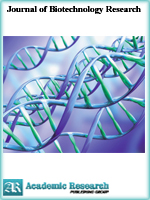Journal of Biotechnology Research
Online ISSN: 2413-3256
Print ISSN: 2413-8878
Print ISSN: 2413-8878
Quarterly Published (4 Issues Per Year)

Archives
Volume 10 Number 2 April 2024
Molecular Determination of Resistance Gene in Methicillin Resistant Staphylococcus aureus (MRSA) Isolated from Skin and Wound
Authors: Diso S.U. ; Mukhtar M. D. ; Dutsinma U. A.
Pages: 26-29
DOI: doi.org/10.32861/jbr.102.26.29
Abstract
The wide spread use of antibiotic resulted in the development of resistance to antibiotics through acquisition of the mobile cassette chromosome carrying the Methicillin-resistant gene mecA. The study was aimed to characterize the resistance gene in Methicillin resistant Staphylococcus aureus (MRSA) isolated from skin and wound samples in Kano Metropolis, Northwestern, Nigeria. A total of 235 S. aureus isolates were identified and subjected to MRSA screening. MRSA were phenotypically identified by antibiotic susceptibility testing using agar disc diffusion method. The suspected MRSA were subjected to polymerase chain reaction (PCR). The PCR products were subjected to gel electrophoresis and a DNA ladder were loaded into the gel wells. The gel was examined for the presence of specific amplicons of the expected size for mecA, which is 192bp. Out of a total of 235 isolates of Staphylococcus aureus, only 11 (4.7%) strains were found to be Methicillin resistant Staphylococcus aureus (MRSA). Five out of the 11 isolates show the presence of DNA bands of the expected size for MecA gene which indicated the presence of the resistance genes in the bacterial isolates. It is concluded that MecA gene is one of the gene responsible for methicillin resistance in MRSA.
Development and Standardization of Sandwich ELISA for the Detection of Canine Parvovirus Infection
Authors: Karman Kour ; Gurpreet Kaur ; Mudit Chandra ; Deepti Narang
Pages: 20-25
DOI: doi.org/10.32861/jbr.102.20.25
Abstract
Canine parvovirus (CPV) is a highly contagious viral pathogen affecting dogs aged 6-21 weeks primarily targeting rapidly dividing cells of GI tract, which leads to haemorrhagic gastroenteritis and symptoms such as fever, vomiting, in appetence and abdominal pain. Several variants include CPV-2, CPV-2b and CPV-2c. CPV can be prevented by timely and complete vaccination and can be treated effectively if timely diagnosis is done. It can be diagnosed by effective methods such as PCR, fecal ELISA, HA and HI, the most effective being ELISA and PCR. Therefore, the present research was aimed at developing and standardizing a Double Antibody Sandwich ELISA for the detection of CPV by using rabbit hyperimmune sera as primary antibody and mice hyperimmune sera as secondary antibody.



